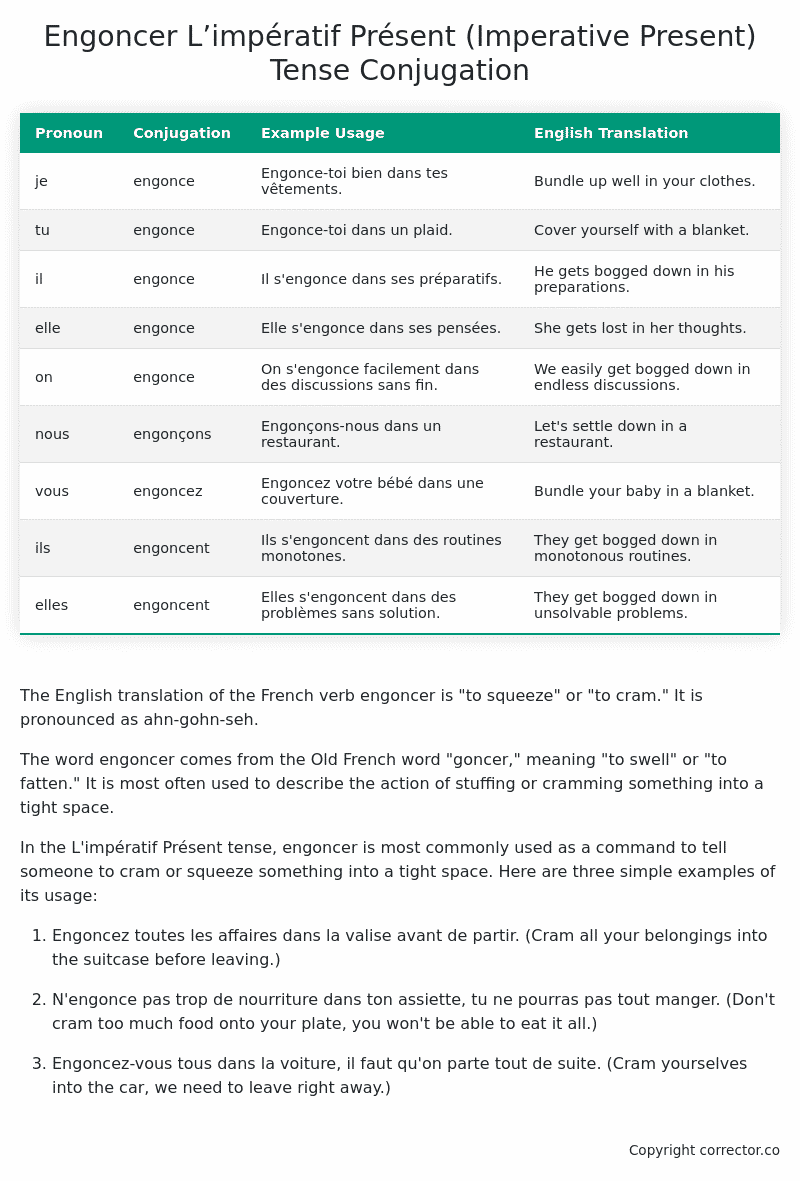L’impératif Présent (Imperative Present) Tense Conjugation of the French Verb engoncer
Introduction to the verb engoncer
The English translation of the French verb engoncer is “to squeeze” or “to cram.” It is pronounced as ahn-gohn-seh.
The word engoncer comes from the Old French word “goncer,” meaning “to swell” or “to fatten.” It is most often used to describe the action of stuffing or cramming something into a tight space.
In the L’impératif Présent tense, engoncer is most commonly used as a command to tell someone to cram or squeeze something into a tight space. Here are three simple examples of its usage:
-
Engoncez toutes les affaires dans la valise avant de partir. (Cram all your belongings into the suitcase before leaving.)
-
N’engonce pas trop de nourriture dans ton assiette, tu ne pourras pas tout manger. (Don’t cram too much food onto your plate, you won’t be able to eat it all.)
-
Engoncez-vous tous dans la voiture, il faut qu’on parte tout de suite. (Cram yourselves into the car, we need to leave right away.)
Table of the L’impératif Présent (Imperative Present) Tense Conjugation of engoncer
| Pronoun | Conjugation | Example Usage | English Translation |
|---|---|---|---|
| je | engonce | Engonce-toi bien dans tes vêtements. | Bundle up well in your clothes. |
| tu | engonce | Engonce-toi dans un plaid. | Cover yourself with a blanket. |
| il | engonce | Il s’engonce dans ses préparatifs. | He gets bogged down in his preparations. |
| elle | engonce | Elle s’engonce dans ses pensées. | She gets lost in her thoughts. |
| on | engonce | On s’engonce facilement dans des discussions sans fin. | We easily get bogged down in endless discussions. |
| nous | engonçons | Engonçons-nous dans un restaurant. | Let’s settle down in a restaurant. |
| vous | engoncez | Engoncez votre bébé dans une couverture. | Bundle your baby in a blanket. |
| ils | engoncent | Ils s’engoncent dans des routines monotones. | They get bogged down in monotonous routines. |
| elles | engoncent | Elles s’engoncent dans des problèmes sans solution. | They get bogged down in unsolvable problems. |
Other Conjugations for Engoncer.
Le Present (Present Tense) Conjugation of the French Verb engoncer
Imparfait (Imperfect) Tense Conjugation of the French Verb engoncer
Passé Simple (Simple Past) Tense Conjugation of the French Verb engoncer
Passé Composé (Present Perfect) Tense Conjugation of the French Verb engoncer
Futur Simple (Simple Future) Tense Conjugation of the French Verb engoncer
Futur Proche (Near Future) Tense Conjugation of the French Verb engoncer
Plus-que-parfait (Pluperfect) Tense Conjugation of the French Verb engoncer
Passé Antérieur (Past Anterior) Tense Conjugation of the French Verb engoncer
Futur Antérieur (Future Anterior) Tense Conjugation of the French Verb engoncer
Subjonctif Présent (Subjunctive Present) Tense Conjugation of the French Verb engoncer
Subjonctif Passé (Subjunctive Past) Tense Conjugation of the French Verb engoncer
Subjonctif Imparfait (Subjunctive Imperfect) Tense Conjugation of the French Verb engoncer
Subjonctif Plus-que-parfait (Subjunctive Pluperfect) Tense Conjugation of the French Verb engoncer
Conditionnel Présent (Conditional Present) Tense Conjugation of the French Verb engoncer
Conditionnel Passé (Conditional Past) Tense Conjugation of the French Verb engoncer
L’impératif Présent (Imperative Present) Tense Conjugation of the French Verb engoncer (this article)
L’infinitif Présent (Infinitive Present) Tense Conjugation of the French Verb engoncer
Struggling with French verbs or the language in general? Why not use our free French Grammar Checker – no registration required!
Get a FREE Download Study Sheet of this Conjugation 🔥
Simply right click the image below, click “save image” and get your free reference for the engoncer L’impératif Présent tense conjugation!

Engoncer – About the French L’impératif Présent (Imperative Present) Tense
Usage
Giving commands
Making requests
Offering advice
Expressing desires
Conjugation Formation
Interactions with other tenses
Want More?
I hope you enjoyed this article on the verb engoncer. Still in a learning mood? Check out another TOTALLY random French verb conjugation!


